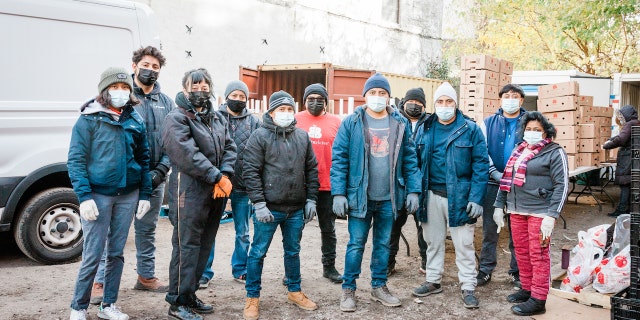A nonprofit located in Queens, New York, is tackling the issue of food insecurity in the United States head-on.
MCDONALD’S CUSTOMER FINDS WEIGHT-LOSS PROMOTION ADDED TO HER DELIVERY ORDER
Before the coronavirus pandemic hit, The Connected Chef focused on education, cooking and gardening classes. The organization’s priorities changed to combating food insecurity when COVID-19 began to spread across New York City, director and co-founder Kim Calichio explained. Calichio and her husband are both restaurant chefs and have been in the food service industry for a very long time.
“We knew that specifically families were going to be now out of work, but also not qualify for unemployment benefits or any other sufficient government aid,” Calichio told Fox News. “We really saw at face value that there were some serious inequities and issues within both food distribution and food access, not just in Queens, but across the country.”
The couple decided to launch the Lifeline Grocery Initiative, which offers free grocery packages to households in need.
The Connected Chef’s efforts come as the food insecurity rate in the United States is on the rise. In 2019, the food insecurity rate had dropped to 35.2 million people, according to the United States Department of Agriculture, the lowest point since the 1990s. Of that, 10.7 million were children.
Now, Feeding America estimates that 42 million people (1 in 8), including 13 million children (1 in 6), may experience food insecurity in 2021 as a result of COVID-19. The organization predicts that about 21.3% of Black Americans, or 1 in 5, may experience food insecurity in 2021, compared to 11% of White individuals, or 1 in 9.
NASHVILLE COVID ICU NURSES GIVE PATIENT A SPA DAY
Every week, The Connected Chef orders thousands of pounds of fresh food from restaurant wholesalers and then repackages and distributes the food to families who are out of work but unable to collect unemployment.
According to Calichio, the community response to the program has been “overwhelming.”
“We created a registration form and put that out to four people that we knew and, within a week’s time, we had over 1,000 people register for free groceries at the height of the pandemic last year,” Calichio said. “Our first week of grocery deliveries we delivered 25 groceries, but then the next week we did 100 families and then 200. Within a month’s time, we were delivering over 500 groceries weekly.”
Currently, The Connected Chef’s grocery delivery program serves 700 families per week.
HUNGER STUDY PREDICTS 168,000 PANDEMIC-LINKED CHILD DEATHS
Calichio said that the biggest challenge the nonprofit has encountered has been creating a new economic model that “hasn’t existed on a larger scale.” The Connected Chef is also looking to change the public’s perception of nonprofits by becoming a source for jobs.
“The way that [the nonprofit] model is set up is there’s a handful of people who are on staff and then it’s very much a volunteer-driven,” Calichio said. “And what we’re working to do is make sure that we’re not solely based on volunteers and we’re really hiring and creating jobs from within the communities that we’re serving as well, too. And that’s both on a decision-making level, within the organization, in our volunteer team and our operations team across the board.”
The Connected Chef currently has 11 paid staff and more than 50 volunteers.

Photo courtesy of Kim Calichio/The Connected Chef
Following the success of the grocery packages, The Connected Chef has launched a sliding scale program that allows families who are more well-off to opt in for groceries at different price points, ranging between $25 to $45.
“Regardless of what you pay, you get the same exact food and the same exact quality as somebody who paying a different price or is not paying anything,” Calichio said. “So by creating this type of model, we’re allowing folks who don’t have money to pay for their groceries to be able to get really good fresh ingredients that are coming from local farms. But if you have the money to pay $35 then great, you do that and then you get to help subsidize this work and this new way of creating access for everybody within our community.”
CLICK HERE TO GET THE FOX NEWS APP
While Calichio acknowledges that The Connected Chef has the potential to one day expand nationwide, she said the goal for now is to create a model that’s sustainable.
“When we’re talking about scaling, the immediate reaction that often people go to is, ‘Oh, this is a great thing, everybody deserves groceries, we should make this available across the country.’ And I think that’s true,” Calichio said. “But I think the way that that’s done is important. And for us, that means creating this model that’s sustainable, that can be then replicated and given to communities across New York and across any other state in the country, so that we can prove that this new way of doing things is possible and allows people to trust and have faith to be able to come away from this old model of street charity and traditional nonprofit to start working in a different way.”